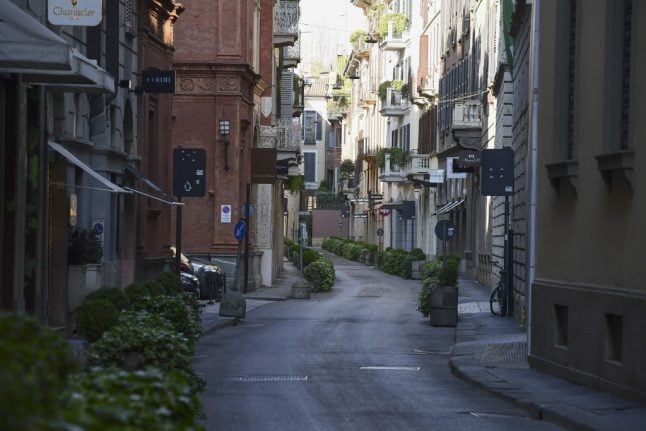Attilo Fontana, the governor of Lombardy and a prominent member of the right-wing populist League party, sparked controversy on Thursday when he outlined his region's “road to freedom” in a Facbeook post.
The wealthy Lombardy region accounts for over a fifth of Italy's economic activity and Milan is home to the Italian headquarters of numerous global firms.
READ ALSO:
But this one region, at the epicentre of the outbreak in Italy, has also seen almost 60 percent of Italy's COVID-19 deaths, or over 11,000 of the total, which rose above 21,500 on Wednesday.
Italy's official toll – which is believed to be substantially underreported – was the world's highest until being overtaken by the United States last weekend.
Lombardy was the first region to cordon off “red zones” as the infection spread, and the first to implement a regional lockdown in early March.
It currently has stricter quarantine rules in place than any other Italian region – with fines of up to 5,000 euros for transgressions (the maximum fine in most of Italy is 3,000 euros).
After Lombardy and other parts of northern Italy went into lockdown, Italy rolled out strict national quarantine measures on March 10.
The restrictions seem to be working so far to contain the outbreak, but have had a severe impact on the country's already struggling economy.
The International Monetary Fund expects Italy's total output to shrink by 9.1 percent this year – the worst peacetime decline in nearly a century.
Millions of Italians are either furloughed or suddenly unemployed, and a growing number of people in Italy haven't got enough money for food and basic necessities.
READ ALSO:
In his Facebook post, Fontana insisted all businesses should reopen when the current nationwide lockdown expires on May 4, following basic social distancing rules.
”Many other European countries are already beginning to reopen. We need to start thinking about our own future immediately,” he said.
Some European nations, such as Denmark, Finland, andLithuania, are now cautiously eyeing ends to their own shutdowns.

Attilo Fontana, the regional governor of Lombardy. Photo: AFP
However most bigger European countries, including neighbouring France where the situation is more similar to that in Italy, are extending their closures for at least a few more weeks.
Italian government officials still follow the advice of doctors who think it is best to keep the nation locked down until new infections sharply drop off.
READ ALSO:
Italy's Deputy Industry Minister Stefano Buffagni called Fontana's message “an error”.
Prime Minister Giuseppe Conte, who continues to urge caution, has been widely applauded for his handing of what is widely viewed as Italy's worst crisis since World War II.
His government last week chose to extend the lockdown until at least May 3rd on the advice of its panel of scientific experts, despite pressure from those who want to restart economic activity this month.
It also allowed a short list of businesses to start reopening across the country from Tuesday April 14th.
READ ALSO:
However, the Lombardy regional administration, led by Fontana, immediately stated that it would not be allowing these businesses to reopen yet.
Lombardy would remain in full lockdown and economic hibernation until May 3rd with no gradual reopening before that date, the region's Welfare Minister Giulio Gallera announced on Saturday.
Fontana came under heavy criticism following his Facbeook post on Thursday, with many saying he seemed to have changed his stance on the issue.
Milan's mayor, Beppe Sala accused Fontana of shifting his position from recently being alarmed about the virus, to now ordering “everyone outside”.
“A little more restraint would not be too much to ask for,” Sala told La Repubblica newspaper.
“I am not against an economic recovery, because it affects the work of so many people,” the Milan mayor said. “But we must provide adequate guarantees first to those who go to work.”



 Please whitelist us to continue reading.
Please whitelist us to continue reading.
Member comments